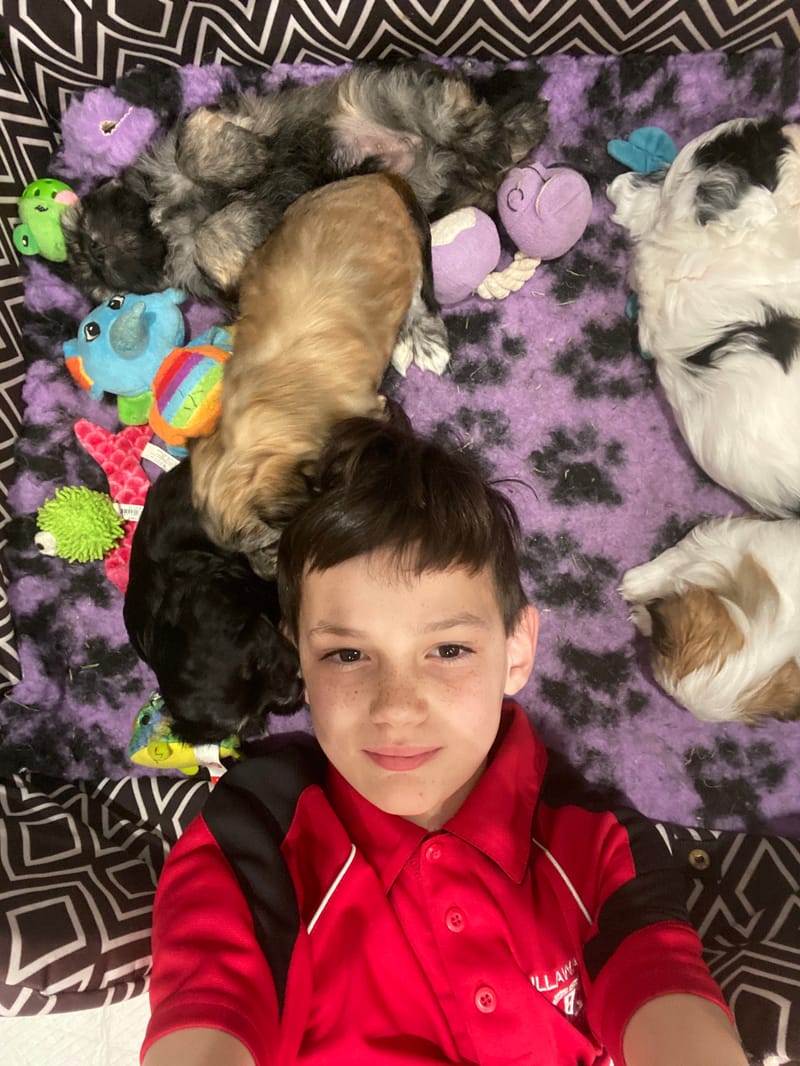Behaviour and socialisation

We encourage puppies curiosity and respond positively when they tackle a new experience.
Puppy socialization begins with the breeder and continues with you.
What is socialisation?
Socialisation is the process by which puppies learn to relate appropriately to people and other animals. It involves meeting and having pleasant encounters with as many adults, children, dogs and other animals as possible. It also involves becoming used to a wide range of events, environments and situations.
Each new experience will help your puppy understand what to make of the world around them. Encountering every new smell, sound and sight in a positive way will build their confidence and let them grow into well-adapted dogs.
The importance of being sociable
Proactively socialising your puppy is very important. Puppies have what is called a ‘critical socialisation period’ between approximately 3 -17 weeks of age. The puppy’s experiences during this critical period of learning and development can influence and shape their behaviour well into adulthood. Providing plenty of opportunities for socialisation and exposure to different environments during this time can help to ensure your puppy grows into a well-adjusted adult that relates well to other dogs, other animals and people.
Our Approach
Gentle handling by us in the first several weeks of your puppy’s life is helpful in the development of a friendly, confident dog. As early as 3 weeks of age, puppies may begin to approach a person who is passively observing them, so being a knowledgeable breeder we encourages a positive experience with people – adults and children — will help shape the puppy’s adult behaviour.
Our mother dogs raise their pups naturally and wean the pups when they are ready. They remain part of the pups lives up until they leave for their new homes.
When pups are ready, they are introduced to the outside and spend time playing on the grass and chasing each other around.
As the puppies develop, we allow them to experience safe inside and outside environments and gentle handling Including:
- loud noises – vacuums, hair dryer, microwave, music, loud children playing
- having various parts of their body handled and inspected – teeth, mouth, paws, etc.
- different types of flooring and ground surfaces including wet grass
- grooming
- bath time
- visiting the vet
- riding in the car
When To Socialize Your Puppy
Puppies who are 8-16 weeks old are in the key stage for developing their socialisation skills. A great solution is to enrol your puppy in puppy school which provides a safe environment for your pet to encounter other humans and puppies and also learn some basic cues.
Before it is safe to take your dog outside, you can still encourage the socialisation process at home. In this period, you can introduce your pet to things such as appliances (especially the noisy vacuum cleaner), new materials under their paws and different scents.
But, be aware that until all puppy vaccinations are complete your pup is at risk of catching a number of contagious, and dangerous, diseases. These include the often deadly Parvovirus. To keep him safe:
- Don't take him anywhere stray or un-vaccinated dogs may have been
- Keep him up off the ground in public areas (in your arms or a carrier)
- Visit homes with fully vaccinated dogs only